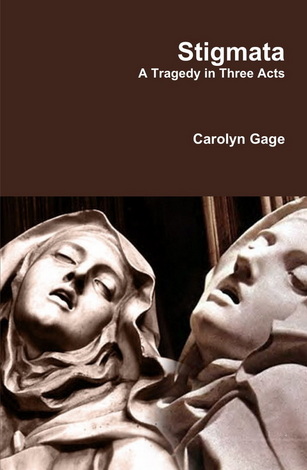Stigmata
A Play in Three Acts
Paperback
eBook (EPUB)
eBook (PDF)
Kindle
Youtube videos of scenes from Stigmata:
First scene: Love scene between Benedetta and the Abbess
Second scene: Benedetta seduces a convent servant, convincing her that she, Benedetta, is embodying the spirit of a male angel sent from God.
Third scene: Benedetta's final revenge on the convent.

- 2019, National Finalist for Jane Chambers Playwriting Award, rescinded for self-publishing and not being recent enough
- 2014, staged reading by Cauldron & Labrys, Portland, ME. (funded in part by a grant from the Maine Acts Commission)
- 2011, Winner, Maine Literary Award in Drama, Maine Writers and Publishers Alliance.
- Excerpted scenes performed Columba College, New Zealand.
Stigmata dramatizes the rise and fall of 17th century, Italian nun Benedetta Carlini, who becomes elected abbess on the strength of her miraculous manifestation of the stigmata, and who is eventually tried by the Inquisition for perpetrating a hoax, as well as committing peccatum mutum, the so-called “silent sin” of homosexuality.
Benedetta’s story begins at a pivotal point in Catholic history, when the Protestant Reformation was gaining momentum and scientific discoveries were increasingly challenging the superstitions and blind faith of an earlier era. The Council of Trent, in an effort to meet these challenges, had passed measures to discourage the obsession with paranormal manifestations of divine favor.
The play opens with a scene where the teenaged Benedetta is directing a re-enactment of the rape of St. Agnes with her girlfriends. Interrupted by her mother, Benedetta defends her dramatic production by explaining that it is her father who has been responsible for her precocious sexuality. Frantic to place Benedetta in a convent, her mother brings her to a religious order in Pescia, outside Florence. Initially rejecting Benedetta because of her class background, the Abbess changes her mind when she witnesses her mother’s abuse. Benedetta fakes her first miracle.
Benedetta becomes the secretary for the Abbess and thrives under her loving mentorship. Given scope for her creativity and ambition, Benedetta has no need for miraculous manifestions. On the eve of their move to a new compound, Benedetta confronts the lesbian dynamic between herself and the Abbess, and the Abbess, in a panic, dies.
At this point, the action shifts to the new convent, where Benedetta’s sudden stigmata has resulted in her becoming elected the new abbess. Ricordati, an old-school priest, protects and enables her, and under his tutelage, Benedetta officially encloses the convent and institutes the austere rules of St. Augustine. These strip her rivals of their privilege, institute the practice of whipping, and consolidate her power. She begins to deliver speeches, in the persona of St. Catherine of Siena, to the terrorized nuns. Finally, she announces that it is God’s will for her to marry Jesus in a formal, public ceremony.
The night before her “wedding,” Benedetta deceives Mea, a convent servant, into submitting sexually to her. She tells the young nun that she, Benedetta, will become possessed by the spirit of a male angel named Splenditello, whom Jesus has sent to marry Mea. Later, at Benedetta’s wedding ceremony, the town Provost exposes her as a fraud, and her shocking abuse of another nun is revealed. These revelations prompt Mea to come forward with her story. Benedetta warns the town that God will send the plague if they dare incarcerate her.
The final act of the play transpires at Benedetta’s deathbed in her prison cell. The plague has returned to Florence, and the townspeople, who have never lost their awe of “Saint” Benedetta, have gathered in a mob to demand her release, so that she will pardon them and lift the curse. Benedetta, defying her former enemies, collapses when the ghost of her beloved Abbess appears. At her death, the new Abbess slashes Benedetta's hands, proclaims the miracle of the stigmata, and ordering Benedetta's body with this manifestation of grace carried out to the rioting townspeople.
12 women, 2 men (2 of the women’s roles may be double-cast)
Multiple venues
2 ½ hours.
"Survivor as Perpetrator: Gage's New Play Acknowledges Contradiction" by Megan Grumbling, The Portland Phoenix, May 22, 2014.
